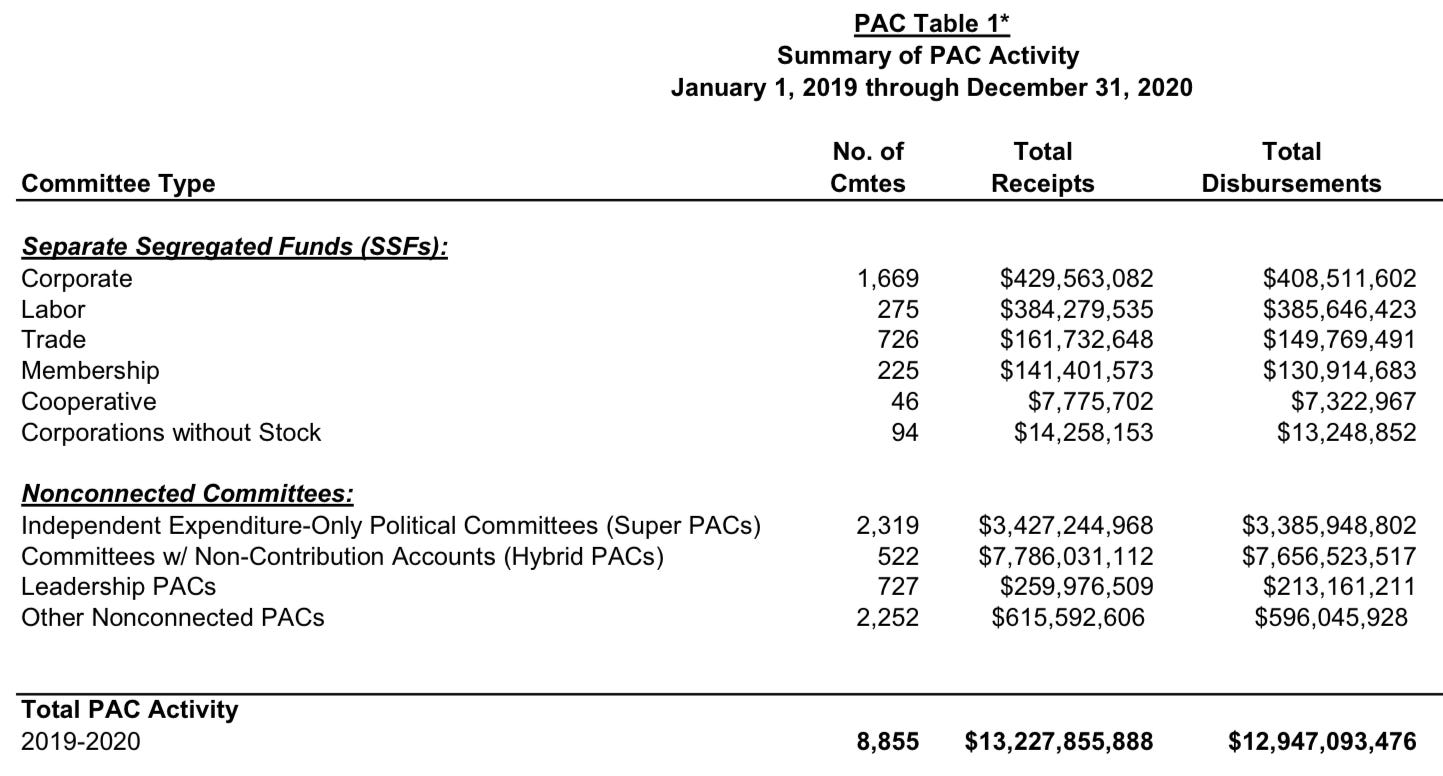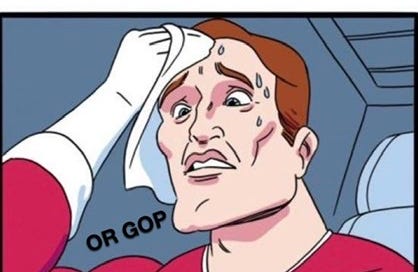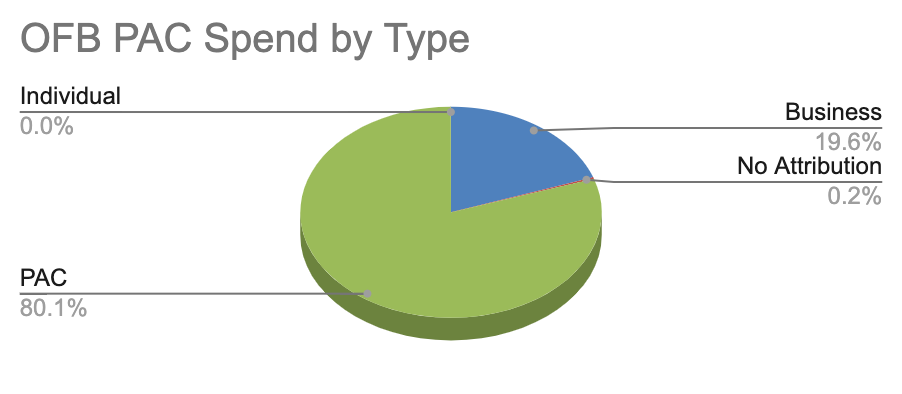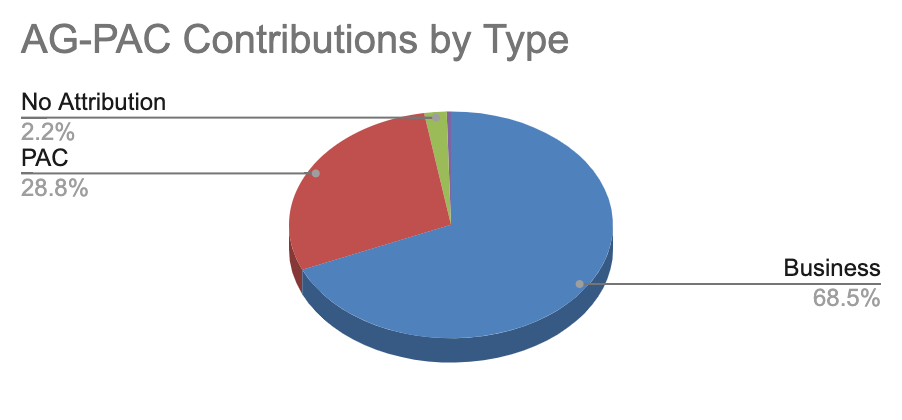Farm workers of Oregon unite! (and get paid!)
Oregon Dems move $ while Oregon GOP does...I mean...nothing?
When you hear local or regional media refer to “controversial” legislation, most would likely think of things like funding cutting edge social safety net programs or acting on climate change or…I don’t know…a lawmaker being expelled for plotting to arrange an Oregon-flavored Jan. 6 on his own colleagues.
But this last legislative session in Oregon - in a testament to how fundamentally craven and inhuman the Republican Party has become - the “controversial” legislation was (checks notes)…paying workers fairly for time worked?
When you unpack the circumstances behind this legislation, it’s clear that Republican opposition (not a single one supported this legislation) is simply an extension of their new brand:
“Fuck it, we’re saying the quiet part out loud and we think fairness should favor white farmers & not the non-white folks that work the crops.”
Or, with perhaps more brand-appropriate brevity, the Oregon GOP is “vanilla-flavored, white supremacy.”
Harsh? Not really.
In fact, it was reported by the Oregon Capital Chronicle, GOP House lawmakers considered deploying their signature move in response to one piece of pro-worker legislation - walking out!
The bill they allegedly were poised to run from? A bill that would require farms to pay farm workers overtime pay. A bill three years in the making. A bill that would require farms to pay their workers fairly for often back-breaking work.
And Republican lawmakers obviously find this type of fairness (mostly impacting non-white people)…well, intolerable.
But, according to news reports and interviews with GOP leaders in the legislature, they were only trying to fight for the farmers & their farms. And, it seems, the Democrat supermajority in the Oregon Legislature yielded to some of those valid concerns - creating a taxpayer funded tax credit & accompanying pool of cash to help farmers adjust to paying their labor fairly. Think of it like a social safety net for when farmers need help adjusting to circumstances often out of their control. Farmer welfare, really.
Wait a minute…did the Oregon GOP just successfully create a socialism right in their own backyard!
But rank hypocrisy and disgusting lack of compassion for humankind aside, House Bill 4002 passed both Oregon House & Senate (again, with no GOP support from either chamber).
The Farmworker Overtime Bill has pretty wide-reaching impact for thousands of workers, their families, and the farms they work on. The legislation, expected to be signed into law by Governor Kate Brown, will result in fair overtime pay rates for some 86,000 farmworkers on 10,000 farms across Oregon.
Lynne Terry writes in the Oregon Capital Chronicle:
The requirement for time-and-a-half pay after a 40-hour workweek would phase in over five years. Farmers would be eligible for tax credits over six years to cushion the impact of the new expense. It also directs state officials to come up with a $10 million grant or loan program by the end of September to compensate farmers for paying overtime.
And, Terry reported in early March, the credit that taxpayers are being asked to pay for carries a $55 million-plus price tag for each of the 6 years of credits being offered ($330 million overall):
The proposal includes four tiers of tax credits, with small dairy farmers getting a full tax credit equal to overtime paid over six years. The credits are refundable, which means that employers can claim them even if they don’t make a profit. Legislative fiscal officers estimate the tax credits would cost Oregon taxpayers an average of $55 million a year.
Opposition to the bill came primarily from The Oregon Farm Bureau, a group that represents 6,700 farms. The group predicts dire consequences for Oregon farmers and predicted the new fair pay rule will cause “many of Oregon’s 10,000 farms to close or to sell to corporations.”
Let’s ignore that completely unsubstantiated (and thoroughly countered) claim. And let’s look into why the Oregon Farm Bureau might make such a careless, baseless objection.
Spoiler Alert: The answer comes from….following the money!
Oregon Farm Bureau claims to be a:
“…grassroots, nonpartisan, nonprofit organization representing the interests of farming and ranching families in the public and policymaking arenas.”
But their campaign finance records paint a very different picture. This “grassroots, nonpartisan” group does represent certain interests in the public & policymaking arenas…but it sure doesn’t seem like farming families.
The Oregon Farm Bureau is, more or less, a series of business arrangements backed by more than $3 million of political campaign contributions & spending. The Oregon Farm Bureau actually runs 2 political action committees:
OREGON FARM BUREAU PAC
Filed original statement of organization with Oregon in 1986
This little PAC went to the market…and spent all (ok, fine - 80%) of its money on Republican candidate campaigns.
And here’s where they raised that money to spend. Businesses have funded more than half (52%) of money raised & spent by the Oregon Farm Bureau PAC. And nearly 40% come from small donors under $100 (for which Oregon does not require detailed reporting).
AG-PAC
Filed original statement of organization with Oregon in 1989
This is the Oregon Farm Bureau’s political action committee focused on supporting pro-farming/pro-agriculture/pro-forestry candidates for office in Oregon. So, basically like the other one, but with a name & mission ambiguous enough that one entity has essentially fabricated two money machines that soak up cash from businesses and spray it thick on Republican candidates. Like…thick, dude. Like…nearly $570k thick (or 95% of all spend).
And they raised all of that money to purchase the attention and favor of Republican politicians from SURPRISE IT’S LIKE 70% MONEY FROM BUSINESSES. And almost all of the remainder is money from other PACS. Just passing money around from candidate to PAC, PAC to candidate. No biggie. It’s only, like, $172,635.
Oregon Farm Bureau Aggregate Political Influence
When you combine the business & influence network that OFB has created with $3 million+ of documented political spending & fundraising across two political action committees, you can see the pattern of how PACs work & how they were designed to create tides of influence.
Total contributions made to both Oregon Farm Bureau PACs - more than $1.5 million - are nearly 60% from business. So the business-powered money tide comes in…
And the $1.5 million money tide goes out, with a stunning 86% of all expenditures going to political candidates - that’s a nearly $1.3 million firehose of political influence.
And if you guess these political candidates are almost 100% Republicans…ding, ding, ding. Your prize is a corrupt campaign finance system!
So this group - the Oregon Farm Bureau - who has worked tirelessly to create unfair conditions where businesses have more political influence than constituents…these are the people who showed up to fight legislation that wanted to pay farm workers fairly.
They asked our legislators to put money above human beings. And they had their Republican legislators - the ones whose allegiance has been purchased with money from businesses passed through PACs and converted into campaign cash - make impassioned speeches and tell daring lies about the impending collapse of every single farm in the state the second this legislation passes.
But that’s actually not the worst part, believe it or not…
Oregon Farm Bureau wants you to believe they are a simple, grassroots organization just looking to give mom & pop farmer a fair shake in Salem.
But, again, campaign finance disclosures & nonprofit information reported to the IRS shows a team of high-paid executives running a political influence operation built on a foundation of multi-national, agri-business, conglomerate corporate money. And a shit load of it.
Here’s a list of the top single donors to both Oregon Farm Bureau PACs:
#5 - Simplot Shared Services: $39,680 (a business entity named J.R. Simplot also kicked in an additional $9k.)
#4 - CC Services Inc.: $43,988 (this is Country Financial, the insurance company the OFB has a heavily intertwined and longstanding business relationship with)
#3 - Oregon Farm Bureau Political Action Committee: $44,300 (this is the OFB donating from their first PAC to their second PAC)
#2 - FirstVote PAC: $53,903 (This is a PAC meant specifically to stop a piece of legislation years ago meant to curb use of genetically engineered crops. Would it surprise you if I told you FirstVote PAC raised most of its money from the same mega corporations the OFB did?)
#1 - MONSANTO….lol: $173,500 (Let us all bow our heads & laugh about the hypocrisy of a nonprofit political machine claiming a bill meant to pay farmworkers fairly would cause “many of Oregon’s 10,000 farms to close or to sell to corporations” actually being built on hundreds of thousands of dollars from the biggest, shittiest corporations on the friggin planet. I don’t care who you are, that shit is delicious.)
What about those 6-figure exec salaries at the Oregon Farm Bureau?
In 2011, nearly 40% of OFB expenses were salaries & wages. And just under 7% of that was spent on executive compensation.
By 2020, OFB salaries and wages where still hovering around 40% of expenses, while executive compensation had increased significantly from just $176k in 2011 to $304k in 2019.
OFB Executive Vice President David Dillon was paid $105,000 in 2010. A decade later, his compensation in 2020 was $174,000 - a 66% increase. While that increase over a decade isn’t outlandish for someone doing their job well, there is some room for debate on whether the longtime exec Dillon (who also chairs both OFB PACs) is actually, y’know, doing a good job.
By the Oregon Farm Bureau’s own language, they are an organization meant to represent the interests and futures of their farm, rancher & agriculture members.
But we already know their political machine exists to serve corporate donors. And from publicly available IRS records we also know that the Oregon Farm Bureau, while boosting exec pay and political spending over the years, has seen steadily declining percentages of revenue from industry & community program services (nearly 30% in 2011 and just 19% of revenue in 2019).

To recap - Oregon Farm Bureau takes a huge (and growing) chunk of political donations from giant corporations & it’s own members and funnels millions to Republican candidates throughout Oregon while the nonprofit’s executive pay has been rising steadily for decades in the face of offering seemingly lower impact program services to it’s members.
Oh, they also seem to feel very strongly that farm workers should be treated as a less valuable group of labor. Whatta legacy 🤮
Buying politicians and their legislative votes is a national crisis
This complex and coordinated network of money & influence & power described above is just one example of the shenanigans behind some of the headlines we see each legislative session.
This has been a story, so far, of one powerful network activating to influence one bill.
Now imagine the networks of money & influence & power behind nearly every bill that reaches not just our Oregon Legislature in Oregon, but state houses across the nation and, of course, Congress in D.C.

Both major political parties rely on these networks to fund their election, and re-election, efforts. And elected officials in both parties are fed thousands & millions of dollars from businesses and industries through PACs that accept large donations from businesses and deliver them to candidates.
In the 2020 election cycle, Democrats nationwide accepted more than HALF A BILLION DOLLARS in dark money. Republicans accepted less than half of that - or around $250 million.
President Biden alone, in his effort to defeat a disgraced, twice-impeached asshole and documented enemy of democracy and fair elections, accepted $174 million in dark money. Decaying Orange Meatsuit & former President Trump brought in just $25 million in dark money in the 2020 cycle.
It worked out for farmworkers in Oregon this time, but…
That’s largely because Democrats hold a super-majority in Oregon politics (where members of one party hold a majority of both state House & Senate seats, as well as the Governor’s seat).
And farmworkers, who in this case were fighting for what amounts to basic human rights, happened to have enough policy-making voices on their side to win fair pay after three years of effort on this bill.
But that was DESPITE the multi-million dollar machine of the Oregon Farm Bureau that has been grinding away on behalf of their corporate friends for decades.
The scales won’t always tip towards fairness, and it’s insane to allow a free-wheeling campaign finance system** to be the variable that decides who gets treated like a human being, and who gets sent away with nothing while corporate donors keep raking in profit & power.
How to learn more about & support farmworkers
If you want to know what these farmworkers actually do and how important they are to our country, there are a few social media accounts you might consider following:
United Farmworkers - twitter.com/UFWupdates
Farmworker Justice - twitter.com/FarmwrkrJustice
Pineros y Campesinos Unidos del Noroeste (PCUN) - twitter.com/PCUNoregon
**And don’t forget that our Oregon Secretary of State Shemia Fagan is preventing campaign finance ballot measures (already approved by a majority of Oregon voters) from moving into the legislative phase based on historically minor (and ignored) technicalities that could be quickly & transparently remedied without compromising the integrity of the process.
Hey SKP readers! This issue was a bit delayed - partially because it was a super interesting story to research & there was a lot to cover. Also partially because, y’know, life is busy sometimes :)
Anyway, thanks for hanging in there with me and being patient! I appreciate you folks. And I aim to bring you meaningful insight on the following topics in the next week-ish:
Coming in the next week-ish:
My story list tends to shuffle around depending on what catches my eye in a particular week. So, in the mix right now:
Congressional candidate finances for CD5 & CD6
Top Twitter follows for Oregon politics #orpol #orleg
There are 87 people running for Governor
Campaign finance insights for races local to Salem & Keizer
Why does a graduate-level legal area of study have conservative activists/parents flipping out and trying to ban books in K-12?












